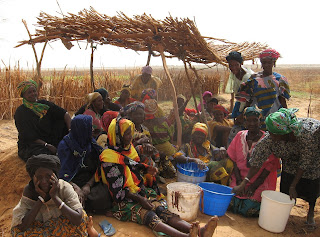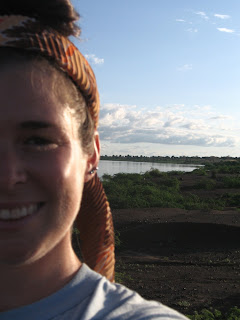

As one of the poorest countries in the world with a literacy rate that is estimated to be only 15% of the population, Niger offers very little with regard to modern income opportunities. Furthermore, women have one of the highest birth averages in the world at 10 children each leaving little time, energy and income to start their own small business enterprises. Accordingly, it is one of my personal goals as well as a Peace Corps program objective to develop sustainable income generating activities for women and girls. Many women in Niger, as well as the women of Kehehe, have formed cooperatives that are legally recognized NGOs who can apply for small microloan credit. Most of them operate a bit more informally by running a caisse system where each woman makes a weekly donation to the caisse that can then be loaned out to a number of women in need for things such as medical expenses or a son's dowry. They also use this money to help get projects started.
Such was the case in our Kehehe Women's Garden project. Informal conversations with many of the village women and the three leaders of the women's cooperatives revealed a great interest in obtaining a plot of land and materials to specifically start a women's garden. With some hemming and hawwing, the village chief finally agreed to loan us a plot of land and maybe, in the future, if the women raise the money, they can buy it off of him. Well, this promise turned out to be empty and I quickly learned that my chief is not always honest, nor supportive of the women in the village. The land he promised was claimed by a Tuareg man who said he earned it in some sort of dispute settlement. Oops! The chief forgot this minor point so we sought out other landowners in the village and with the help of an incredibly generous elder, were given a plot that the women can use in perpetuity.
Working closely with the village women's leader who is now one of my closest friends and a person I have grown to admire for her humor and grace, we held several meetings where 75 women attended to express their interest and sign up for work. In the following weeks we prepared the garden beds, obtained new varieties of seeds to introduce to the region and after the second big rain, gathered at the field to plant our starter beds of lettuce, tomato, okra, watermelon, hibiscus and moringa, a fast growing tree rich in vitamin A.
The project has not been without several bumps, however. After preparing the second plot of land we were given and getting ready to plant the seeds, the women informed me that the lake could possibly rise up to the level of the garden, flooding out part of our work. We took steps to mitigate this along the way, having to move our plot altogether, transplant tomatoes and trees and come up with a quick fix so the crickets wouldn't eat everything, but in the end, we had so much rain this year, that the lake flooded out our entire garden as well as several villagers millet fields.
And while this project sounds like a failure, so much grew out of it! The village women were consistently enthusiastic and gracious. While they were disappointed that their work was lost, they still remain eager to start up again in the cold season when the lake recedes. At moments when I was on the brink of tears for not being able to explain myself clearly, for being angry at the chief for his lack of support and for not having any more ideas to save our plants, I would look around at the resilience and perserverance of these fantastic women and know that their patience would carry us forward.
(photo index: my women's leader, Shouda and her friend standing in our flooded garden. See the water to their left?! women taking a rest as we prepared garden beds in June)
Such was the case in our Kehehe Women's Garden project. Informal conversations with many of the village women and the three leaders of the women's cooperatives revealed a great interest in obtaining a plot of land and materials to specifically start a women's garden. With some hemming and hawwing, the village chief finally agreed to loan us a plot of land and maybe, in the future, if the women raise the money, they can buy it off of him. Well, this promise turned out to be empty and I quickly learned that my chief is not always honest, nor supportive of the women in the village. The land he promised was claimed by a Tuareg man who said he earned it in some sort of dispute settlement. Oops! The chief forgot this minor point so we sought out other landowners in the village and with the help of an incredibly generous elder, were given a plot that the women can use in perpetuity.
Working closely with the village women's leader who is now one of my closest friends and a person I have grown to admire for her humor and grace, we held several meetings where 75 women attended to express their interest and sign up for work. In the following weeks we prepared the garden beds, obtained new varieties of seeds to introduce to the region and after the second big rain, gathered at the field to plant our starter beds of lettuce, tomato, okra, watermelon, hibiscus and moringa, a fast growing tree rich in vitamin A.
The project has not been without several bumps, however. After preparing the second plot of land we were given and getting ready to plant the seeds, the women informed me that the lake could possibly rise up to the level of the garden, flooding out part of our work. We took steps to mitigate this along the way, having to move our plot altogether, transplant tomatoes and trees and come up with a quick fix so the crickets wouldn't eat everything, but in the end, we had so much rain this year, that the lake flooded out our entire garden as well as several villagers millet fields.
And while this project sounds like a failure, so much grew out of it! The village women were consistently enthusiastic and gracious. While they were disappointed that their work was lost, they still remain eager to start up again in the cold season when the lake recedes. At moments when I was on the brink of tears for not being able to explain myself clearly, for being angry at the chief for his lack of support and for not having any more ideas to save our plants, I would look around at the resilience and perserverance of these fantastic women and know that their patience would carry us forward.
(photo index: my women's leader, Shouda and her friend standing in our flooded garden. See the water to their left?! women taking a rest as we prepared garden beds in June)


1 comment:
Salamu allaykum kelly,
kina lahia!
malam Ila ne ke rubutamiki wannan "comment". ina murna wanan "blog" da kinka yi bissa garinmu kehehe.nassan bakki gané ko wannéné ba.niné wanda yannada garka bissa hanyan garin fachi. wanan garka akoy mango tchiki. inna ayki a garin Niamey. mu taba haduwa daké tchi wattan "AUGUST".guidana yana yamma da guida CHAOUDA kunguina mata. inna matuka godiya da kin kassa yanzu duka dunia tanada labarin garin kehehe. wanan alheri . yanzu inkinason wani labarin na garin kehehe say rubutomini ga adrechina na mail.
Post a Comment